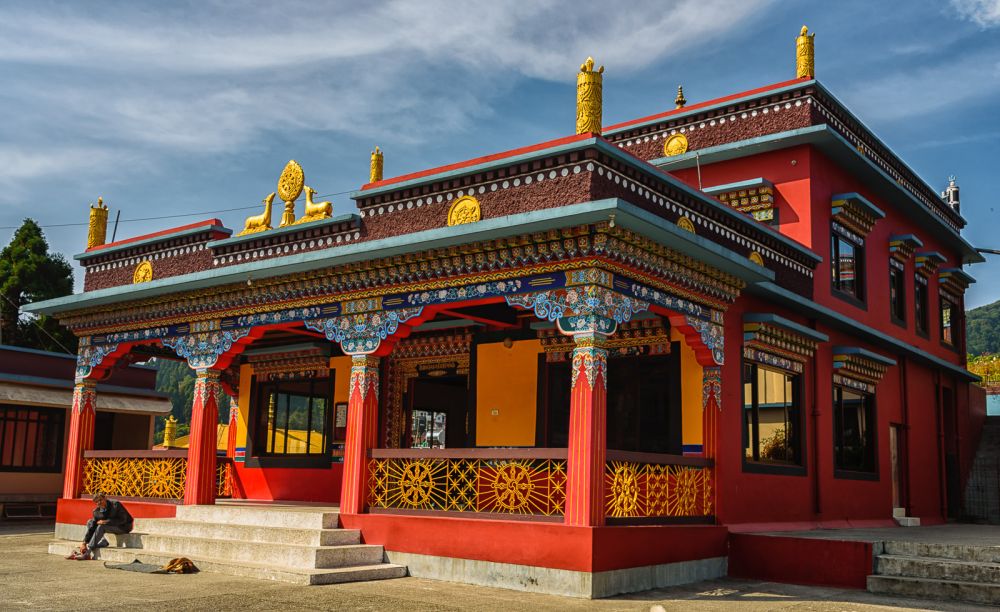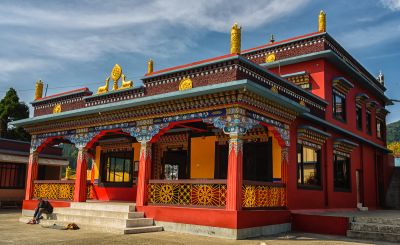

The Introduction to Buddhism course at the Kagyu Institute of Buddhist Studies offers newcomers a comprehensive overview of the fundamental concepts and practices of Buddhism. It's an excellent opportunity for participants to explore the rich philosophical heritage and learn the basics of meditation under the guidance of experienced practitioners. Through interactive sessions, participants will delve into topics such as the life of Buddha, the Four Noble Truths, the Eightfold Path, and Buddhist ethics. The course is designed not only to provide theoretical knowledge but also to offer practical insights applicable to daily living, enhancing mindfulness, compassion, and inner peace.
Phowa is a revered and traditional meditative practice in Tibetan Buddhism centered around the transference of consciousness at the time of death. The Kagyu Institute's Phowa Meditation Retreat is a profound spiritual experience led by accomplished meditation masters. Over the course of the retreat, students will engage in intensive meditation sessions aimed at preparing for the end of life process. They will receive teachings on the nature of consciousness, death, and the afterlife, as defined in Tibetan Buddhist thought. Attendees will also practice specific techniques designed to help guide the consciousness toward enlightenment or a favorable rebirth.
The Weekend Meditation Workshops provided by the Kagyu Institute are the perfect respite for individuals looking to find a balance between the bustling city life and their inner serenity. These workshops cover various meditation techniques, including mindfulness, loving-kindness, and visualization practices. Attendees will learn how to cultivate a meditation habit, improve their focus, and reduce stress. Each workshop is curated to accommodate people with different levels of experience, from absolute beginners to those who wish to deepen their existing meditation practice. The sessions are typically followed by Q&A, allowing for a deeper understanding of the practice.
As one of the richest Buddhist cultural traditions, Tibetan language and literature hold immense importance for students of Buddhism. Kagyu Institute's course is curated to help students learn classical Tibetan, which is essential for reading and interpreting ancient Buddhist texts. The curriculum covers grammar, vocabulary, and conversation, with a specific focus on translating spiritual scriptures. Scholars with years of experience teach the course, and it is suitable for individuals of diverse backgrounds interested in pursuing in-depth Buddhist studies or enhancing their understanding of Tibetan culture.
The Full Moon Puja at the Kagyu Institute is a monthly gathering that allows practitioners and local community members to take part in a traditional Buddhist ceremony. It is held on the day of the full moon each month, as this is considered an auspicious day in Buddhist tradition. The Puja involves chanting, meditation, and offerings. It is a time to reflect on the practice of generosity, to purify negative karma, and to pray for peace and wellbeing for all sentient beings. The ceremony is also an opportunity for communal bonding and for participants to receive blessings from the monastic community.
The Kagyu Institute hosts a series of seminars on Buddhist philosophy that delve deep into the intellectual aspects of Buddhism. These seminars offer attendees the chance to engage with profound philosophical questions about the nature of reality, consciousness, and ethics. Leading Buddhist scholars from around the world are often invited to present their research and perspectives. These gatherings provide a fertile ground for discussion, debate, and the clearing of doubts, invaluable for anyone looking to pursue an academic or personal interest in the finer points of Buddhist thought.
The Kagyu Institute offers a creative and educational workshop on Buddhist art and iconography. This unique program gives participants a hands-on opportunity to learn about the symbolic meanings of different Buddhist figures, the rituals involving Buddhist art, and the process of creating traditional thangka paintings. Expert artisans guide attendees through the history and techniques behind these sacred creations. The workshop is not only a chance to appreciate Buddhist art aesthetically but also an experiential way to engage with Buddhist teachings and meditative practices through artistic expression.
Modern life is rife with stress, and the Kagyu Institute's Mindfulness for Stress Reduction Course is specifically designed to address this pervasive issue. Over a series of sessions, participants are taught mindfulness practices that help reduce anxiety, improve mental clarity, and enhance emotional resilience. The curriculum combines theoretical lessons on the nature of stress with practical mindfulness exercises, including breathing techniques and guided meditations. The course is facilitated by experienced instructors who provide personalized guidance to ensure that each participant can apply mindfulness effectively in their daily lives.
Combining the physical benefits of yoga with the mental clarity achieved through meditation, the Yoga and Meditation Retreat at Kagyu Institute is a holistic experience for participants seeking inner balance and wellbeing. This retreat features daily yoga sessions suitable for all levels, complemented by meditation practices grounded in Buddhist traditions. A tranquil and supportive atmosphere promotes deep relaxation and personal growth. Expert instructors guide participants through asanas (yoga poses), pranayama (breath control), and dhyana (meditation), facilitating a journey towards physical and spiritual harmony.
For practitioners with a keen interest in esoteric Buddhism, the Kagyu Institute's Vajrayana Practices Workshop is an immersive introduction to advanced tantric methods. This workshop covers the preliminary practices (Ngöndro), visualization techniques, mantra recitation, and the use of ritual objects like vajras, bells, and malas. Attendees should have a foundational understanding of Buddhist principles as this course is geared toward deepening one's spiritual practice. It is often mandatory to have received an initiation or permission from a qualified Vajrayana teacher before participating in these advanced practices.
